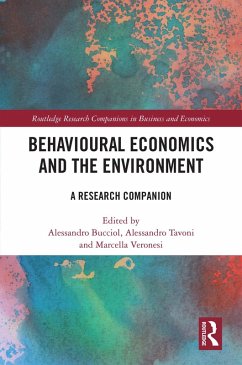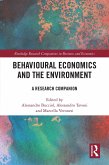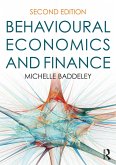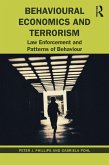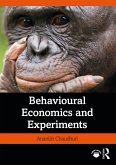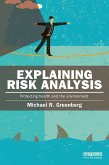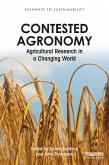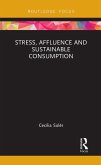Behavioural Economics and the Environment (eBook, ePUB)
A Research Companion
Redaktion: Bucciol, Alessandro; Veronesi, Marcella; Tavoni, Alessandro
39,95 €
39,95 €
inkl. MwSt.
Sofort per Download lieferbar

20 °P sammeln
39,95 €
Als Download kaufen

39,95 €
inkl. MwSt.
Sofort per Download lieferbar

20 °P sammeln
Jetzt verschenken
Alle Infos zum eBook verschenken
39,95 €
inkl. MwSt.
Sofort per Download lieferbar
Alle Infos zum eBook verschenken

20 °P sammeln
Behavioural Economics and the Environment (eBook, ePUB)
A Research Companion
Redaktion: Bucciol, Alessandro; Veronesi, Marcella; Tavoni, Alessandro
- Format: ePub
- Merkliste
- Auf die Merkliste
- Bewerten Bewerten
- Teilen
- Produkt teilen
- Produkterinnerung
- Produkterinnerung

Bitte loggen Sie sich zunächst in Ihr Kundenkonto ein oder registrieren Sie sich bei
bücher.de, um das eBook-Abo tolino select nutzen zu können.
Hier können Sie sich einloggen
Hier können Sie sich einloggen
Sie sind bereits eingeloggt. Klicken Sie auf 2. tolino select Abo, um fortzufahren.

Bitte loggen Sie sich zunächst in Ihr Kundenkonto ein oder registrieren Sie sich bei bücher.de, um das eBook-Abo tolino select nutzen zu können.
This book is a comprehensive and innovative tool for researchers and students interested in the behavioural economics of the environment and in the design of policy interventions aimed at reducing the human impact on the environment.
- Geräte: eReader
- ohne Kopierschutz
- eBook Hilfe
- Größe: 5.95MB
Andere Kunden interessierten sich auch für
![Behavioural Economics and the Environment (eBook, PDF) Behavioural Economics and the Environment (eBook, PDF)]() Behavioural Economics and the Environment (eBook, PDF)39,95 €
Behavioural Economics and the Environment (eBook, PDF)39,95 €![Behavioural Economics and Finance (eBook, ePUB) Behavioural Economics and Finance (eBook, ePUB)]() Michelle BaddeleyBehavioural Economics and Finance (eBook, ePUB)57,95 €
Michelle BaddeleyBehavioural Economics and Finance (eBook, ePUB)57,95 €![Behavioural Economics and Terrorism (eBook, ePUB) Behavioural Economics and Terrorism (eBook, ePUB)]() Peter J. PhillipsBehavioural Economics and Terrorism (eBook, ePUB)39,95 €
Peter J. PhillipsBehavioural Economics and Terrorism (eBook, ePUB)39,95 €![Behavioural Economics and Experiments (eBook, ePUB) Behavioural Economics and Experiments (eBook, ePUB)]() Ananish ChaudhuriBehavioural Economics and Experiments (eBook, ePUB)52,95 €
Ananish ChaudhuriBehavioural Economics and Experiments (eBook, ePUB)52,95 €![Explaining Risk Analysis (eBook, ePUB) Explaining Risk Analysis (eBook, ePUB)]() Michael GreenbergExplaining Risk Analysis (eBook, ePUB)49,95 €
Michael GreenbergExplaining Risk Analysis (eBook, ePUB)49,95 €![Contested Agronomy (eBook, ePUB) Contested Agronomy (eBook, ePUB)]() Contested Agronomy (eBook, ePUB)35,95 €
Contested Agronomy (eBook, ePUB)35,95 €![Stress, Affluence and Sustainable Consumption (eBook, ePUB) Stress, Affluence and Sustainable Consumption (eBook, ePUB)]() Cecilia SolérStress, Affluence and Sustainable Consumption (eBook, ePUB)20,95 €
Cecilia SolérStress, Affluence and Sustainable Consumption (eBook, ePUB)20,95 €-
-
-
This book is a comprehensive and innovative tool for researchers and students interested in the behavioural economics of the environment and in the design of policy interventions aimed at reducing the human impact on the environment.
Dieser Download kann aus rechtlichen Gründen nur mit Rechnungsadresse in A, B, BG, CY, CZ, D, DK, EW, E, FIN, F, GR, HR, H, IRL, I, LT, L, LR, M, NL, PL, P, R, S, SLO, SK ausgeliefert werden.
Produktdetails
- Produktdetails
- Verlag: Taylor & Francis eBooks
- Seitenzahl: 418
- Erscheinungstermin: 15. Februar 2023
- Englisch
- ISBN-13: 9781000827033
- Artikelnr.: 67137262
- Verlag: Taylor & Francis eBooks
- Seitenzahl: 418
- Erscheinungstermin: 15. Februar 2023
- Englisch
- ISBN-13: 9781000827033
- Artikelnr.: 67137262
- Herstellerkennzeichnung Die Herstellerinformationen sind derzeit nicht verfügbar.
Alessandro Bucciol is Professor of Econometrics at the University of Verona, Italy. His fields of research are household finance, behavioural economics, economic policy analysis and, in general, applied micro-econometrics. Among other topics, his research focusses on unethical behaviour, policy evaluation and pro-environmental decisions. Alessandro Tavoni is Associate Professor of Economics at the University of Bologna, Italy. His research spans several topics in environmental economics, primarily related to overcoming behavioural and political economy barriers to cooperation in the (climate) commons. This is tackled through a combination of game theory models, surveys, laboratory and field experiments in an effort to shed light on potential solutions to environmental dilemmas. Marcella Veronesi is Professor of Applied Economics at the Technical University of Denmark and Associate Professor of Economic Policy at the University of Verona, Italy. Her fields of research are applied micro-economics, environmental economics, and behavioural economics. Her research focusses on topics related to the economics of health and the environment, climate change adaptation and education, renewable energy technology adoption, food security in developing countries and the non-market valuation of public goods.
1 An introduction to the behavioural economics of the environment I
Behavioral factors and environmental sustainability 2 A behavioral
(economics) framework for sustainable transformation 3 Farmer heterogeneity
and the greening of agriculture: The role of behavioural and
financial-economic factors in explaining farming practices 4 How are social
preferences of youth related to their motivations to invest in
environmental conservation (local public goods)? 5 Why do fishermen comply
with regulations? The role of preferences 6 Training, locus of control and
sustainable land management in Upper West Ghana II Experiments on
behavioural economics and the environment 7 Why do outsiders make donations
to public good providers? 8 The impact of participatory interventions on
pro-social behaviour in environmental and natural resource management:
Evidence from the lab and the field 9 Comparative feedback and fairness in
promoting cooperation: Laboratory evidence from a common-pool resource
experiment 10 The choice of institutions to promote cooperation in the lab
11 The announcement effect: Early warnings of future thresholds under
different framing and risk contexts III Nudges and environmental behaviour
12 On the use of behavioural instruments to affect individual waste
production and disposal decisions 13 A critical assessment of the
effectiveness of low-carbon nudges 14 When green nudges (don't) work IV
Unexpected shocks, environment, and behavioural consequences 15 A shock
doctrine for the climate: Pro-environmental behavior following natural
disasters 16 Spillover effects of natural disasters on human capital 17
Mitigating negative consequences of unexpected environmental shocks: PES
programs, climate uncertainty, insurance, and inspections 18 Priming
prosocial behavior and expectations in response to the Covid-19 pandemic:
Evidence from an online experiment
Behavioral factors and environmental sustainability 2 A behavioral
(economics) framework for sustainable transformation 3 Farmer heterogeneity
and the greening of agriculture: The role of behavioural and
financial-economic factors in explaining farming practices 4 How are social
preferences of youth related to their motivations to invest in
environmental conservation (local public goods)? 5 Why do fishermen comply
with regulations? The role of preferences 6 Training, locus of control and
sustainable land management in Upper West Ghana II Experiments on
behavioural economics and the environment 7 Why do outsiders make donations
to public good providers? 8 The impact of participatory interventions on
pro-social behaviour in environmental and natural resource management:
Evidence from the lab and the field 9 Comparative feedback and fairness in
promoting cooperation: Laboratory evidence from a common-pool resource
experiment 10 The choice of institutions to promote cooperation in the lab
11 The announcement effect: Early warnings of future thresholds under
different framing and risk contexts III Nudges and environmental behaviour
12 On the use of behavioural instruments to affect individual waste
production and disposal decisions 13 A critical assessment of the
effectiveness of low-carbon nudges 14 When green nudges (don't) work IV
Unexpected shocks, environment, and behavioural consequences 15 A shock
doctrine for the climate: Pro-environmental behavior following natural
disasters 16 Spillover effects of natural disasters on human capital 17
Mitigating negative consequences of unexpected environmental shocks: PES
programs, climate uncertainty, insurance, and inspections 18 Priming
prosocial behavior and expectations in response to the Covid-19 pandemic:
Evidence from an online experiment
1 An introduction to the behavioural economics of the environment I
Behavioral factors and environmental sustainability 2 A behavioral
(economics) framework for sustainable transformation 3 Farmer heterogeneity
and the greening of agriculture: The role of behavioural and
financial-economic factors in explaining farming practices 4 How are social
preferences of youth related to their motivations to invest in
environmental conservation (local public goods)? 5 Why do fishermen comply
with regulations? The role of preferences 6 Training, locus of control and
sustainable land management in Upper West Ghana II Experiments on
behavioural economics and the environment 7 Why do outsiders make donations
to public good providers? 8 The impact of participatory interventions on
pro-social behaviour in environmental and natural resource management:
Evidence from the lab and the field 9 Comparative feedback and fairness in
promoting cooperation: Laboratory evidence from a common-pool resource
experiment 10 The choice of institutions to promote cooperation in the lab
11 The announcement effect: Early warnings of future thresholds under
different framing and risk contexts III Nudges and environmental behaviour
12 On the use of behavioural instruments to affect individual waste
production and disposal decisions 13 A critical assessment of the
effectiveness of low-carbon nudges 14 When green nudges (don't) work IV
Unexpected shocks, environment, and behavioural consequences 15 A shock
doctrine for the climate: Pro-environmental behavior following natural
disasters 16 Spillover effects of natural disasters on human capital 17
Mitigating negative consequences of unexpected environmental shocks: PES
programs, climate uncertainty, insurance, and inspections 18 Priming
prosocial behavior and expectations in response to the Covid-19 pandemic:
Evidence from an online experiment
Behavioral factors and environmental sustainability 2 A behavioral
(economics) framework for sustainable transformation 3 Farmer heterogeneity
and the greening of agriculture: The role of behavioural and
financial-economic factors in explaining farming practices 4 How are social
preferences of youth related to their motivations to invest in
environmental conservation (local public goods)? 5 Why do fishermen comply
with regulations? The role of preferences 6 Training, locus of control and
sustainable land management in Upper West Ghana II Experiments on
behavioural economics and the environment 7 Why do outsiders make donations
to public good providers? 8 The impact of participatory interventions on
pro-social behaviour in environmental and natural resource management:
Evidence from the lab and the field 9 Comparative feedback and fairness in
promoting cooperation: Laboratory evidence from a common-pool resource
experiment 10 The choice of institutions to promote cooperation in the lab
11 The announcement effect: Early warnings of future thresholds under
different framing and risk contexts III Nudges and environmental behaviour
12 On the use of behavioural instruments to affect individual waste
production and disposal decisions 13 A critical assessment of the
effectiveness of low-carbon nudges 14 When green nudges (don't) work IV
Unexpected shocks, environment, and behavioural consequences 15 A shock
doctrine for the climate: Pro-environmental behavior following natural
disasters 16 Spillover effects of natural disasters on human capital 17
Mitigating negative consequences of unexpected environmental shocks: PES
programs, climate uncertainty, insurance, and inspections 18 Priming
prosocial behavior and expectations in response to the Covid-19 pandemic:
Evidence from an online experiment
